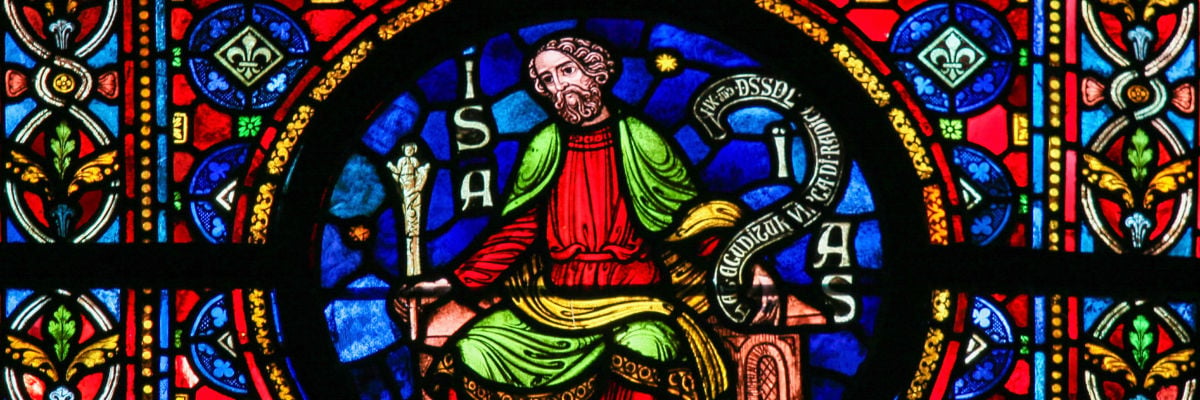
Catholics today often have their backs to the wall when it comes to the vicar of Christ. We have to defend Pope Francis against Protestant and Orthodox critics—and even against other Catholics! And not just this pope, but the pope as a concept—even if we prudentially disagree with the pope sometimes, we nonetheless accept that he is the vicar of Christ, the successor of Peter, and has supreme and infallible authority over the Church.
So why would anyone believe in the papacy? Well, there’s a strong and simple reason to start with: it’s taught in Scripture.
Let’s rewind about two thousand years to Caesarea Philippi , to the events recorded in Matthew 16:19. Jesus says to Peter, “I will give you the keys of the kingdom of heaven; and whatever you bind on earth shall have been bound in heaven, and whatever you loose on earth shall have been loosed in heaven” (NASB).
Seems obvious enough, right? But many opponents of the Catholic faith have worked hard to pick apart this verse to establish the papacy, and many Catholics have offered well known defenses for the Catholic interpretation of it. So it’s worthwhile to look deeper into what Jesus is saying and see where our Lord is coming from. He didn’t come up with these words out of nowhere; rather, Jesus is drawing from Isaiah 22.
In that day I will call my servant Eliakim the son of Hilkiah, and I will clothe him with your robe, and will bind your girdle on him, and will commit your authority to his hand; and he shall be a father to the inhabitants of Jerusalem and to the house of Judah. And I will place on his shoulder the key of the house of David; he shall open, and none shall shut; and he shall shut, and none shall open (vv. 20-22).
So what does Isaiah reveal that Jesus is doing here in Matthew’s Gospel, and how does it affirm the papacy? Jesus is in effect appointing Peter as chief steward (similar to a prime minister today) over the Church, as Eliakim once was over Israel.
The chief steward in the Old Testament had remarkable authority. Archeologist Roland de Vaux and Old Testament scholar Tryggve N.D. Mettinger liken the office to Joseph’s position under Pharaoh. Recall that all of Pharaoh’s possessions, including his own house or palace, were placed under Joseph’s care (Gen. 39:5; Ps. 105:21). Eliakim is similarly described as “over the [king’s] house” as its master or chief steward (2 Kings 19:2; Isa. 36:22). His jurisdiction as “father” extends not only over the house of David, but “to the inhabitants of Jerusalem and to the house of Judah” (Isa. 22:21).
(It’s worth noting here that after King Solomon’s reign ended, Israel split in half, into the northern kingdom, called Israel, and southern kingdom, called Judah. During the stewardship of Eliakim under King Hezekiah, the northern kingdom was under Assyrian occupation. Thus, by process of elimination, all that remained of Israel was under Eliakim’s jurisdiction. It is still appropriate to say that he possessed universal jurisdiction over the kingdom.)
Let’s talk about the connection between Eliakim and Peter. First, note the common structure: someone with key(s) of a kingdom (David/heaven) exercises definitive use of them (open-shut/bind-loose). “Opening and shutting” probably refers to the chief steward’s ability to decide who may see the king based on the steward opening or shutting the doors of the palace or any other royal estate. “Binding and loosing” is a common Jewish phrase for the authority to interpret Scripture and thereby decide who may enter or be excommunicated from God’s community.
There are other uncanny similarities between Peter and Eliakim that bolster the papacy. Both are compared to an object—Peter to a rock (Matt. 16:18) and Eliakim to a peg (Isa. 22:23). Their names always appear first on the list of their kings’ servants (2 Kings 18:18; Matt. 10:2). They both represent a transition from corruption to purity: Eliakim replaces the corrupt Shebna (Isa. 22:15-22), and Peter (as the rock of Christ’s Church) triumphs over the pagan rock of Caesarea Philippi. The rock had been a worship site for the deity Pan, and the city itself was named in honor of Caesar Augustus by Philip the Tetrarch, Herod the Great’s son. Jesus’ bold proclamation about Peter and the Church occurs in a location entrenched in paganism.
The final and most important sign pointing to the Isaiah-Matthew parallel is Jesus himself. Nathan prophesies in 2 Samuel 7:8-17 that one of David’s sons will establish David’s kingdom forever and be God’s son. Luke 1:32-33 boldly declares, “He [Jesus] will be great, and will be called the Son of the Most High, and the Lord God will give to him the throne of his ancestor David. He will reign over the house of Jacob forever, and of his kingdom there will be no end.” Jesus even quotes Isaiah 61:1-2 to disclose his messianic identity (Luke 4:16-21). Not only does the Isaiah-Matthew parallel make perfect sense in light of Jesus’ royal ancestry, but it is expected, given Jesus’ tendency to mention Isaiah when his identity is revealed.
No matter what controversies surround the papacy, we can know with confidence that the office was instituted by Christ. The pope is not just another bishop or theologian, but is the highest royal official in Christ’s Davidic kingdom. Like the Israelites in the Old Testament, we are under the kingship of David’s son and the chief steward of the son’s kingdom.



